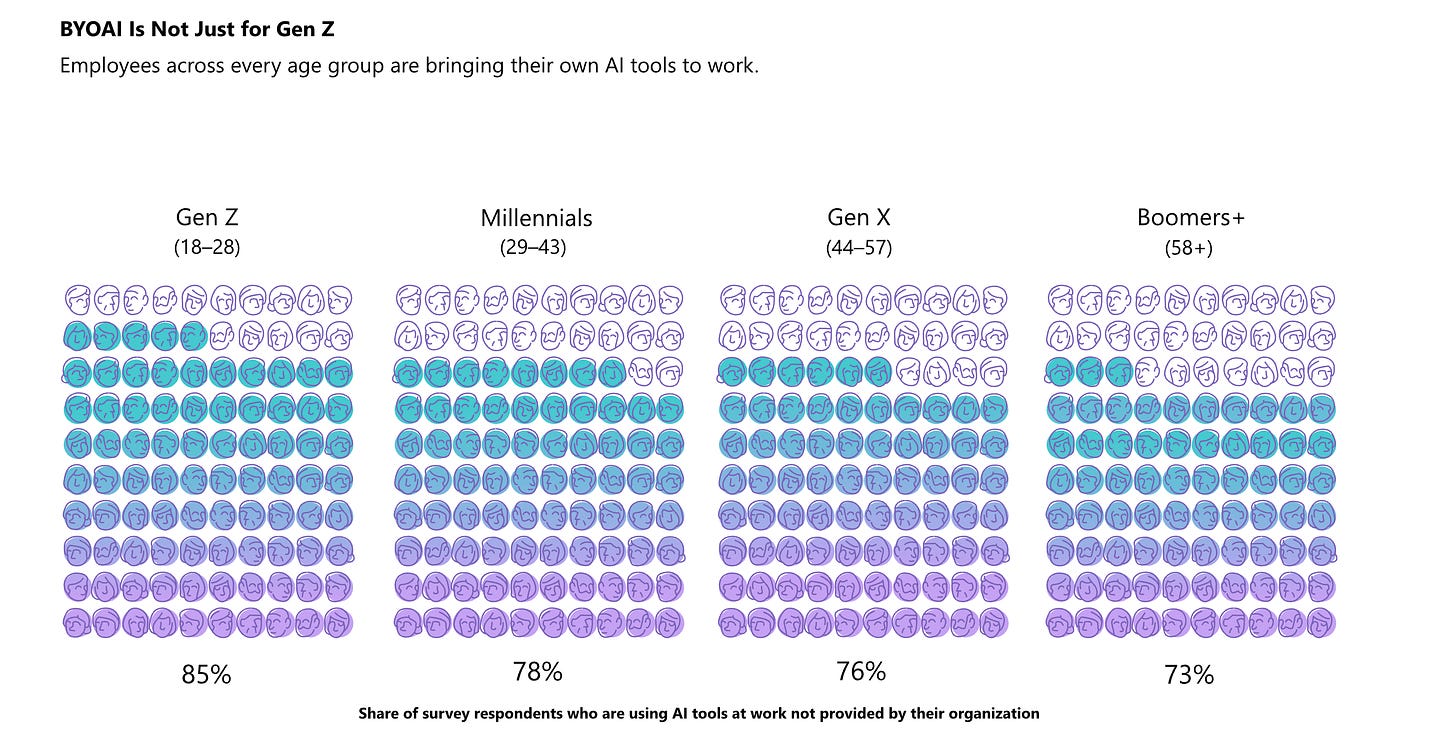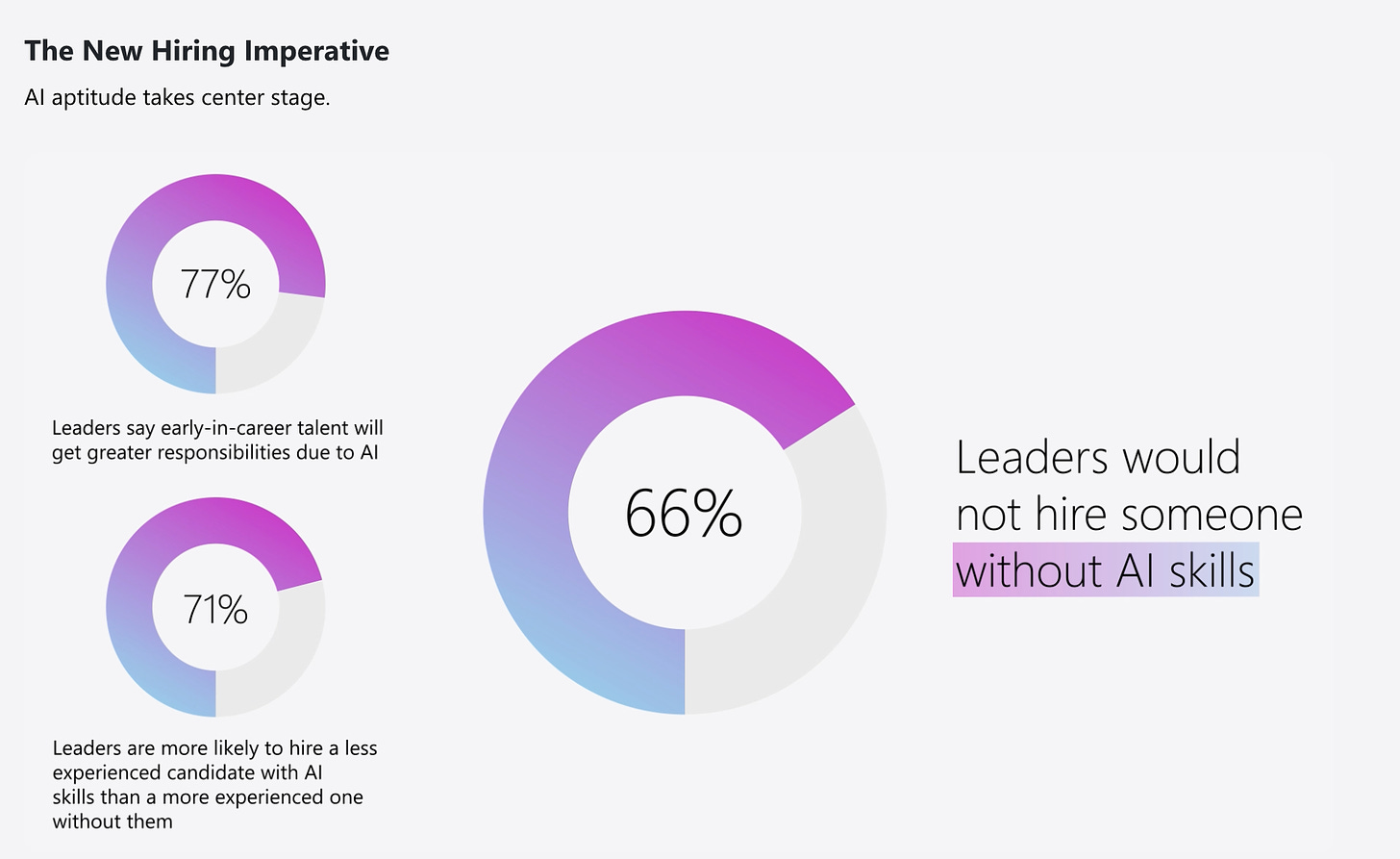Recruiter's AI Digest #57
Resources and perspectives to keep you ahead of the curve as AI deepens its impact in Recruiting. 🤖
Welcome to the community of 3,000 forward-thinking recruiting leaders. 🎉 We stay on the pulse of AI and its impact on recruiting, so you don’t have to!
If you haven’t already, don’t forget to subscribe to this newsletter.
This week’s digest
Check out the awesome material this week 📖 :
AI at Work Is Here. Now Comes the Hard Part
(Microsoft)Introducing GPT-4o
(OpenAI)Enterprise Talent Intelligence Applying Skills Technology and AI at Work
(Josh Bersin)
Are there people you know struggling to digest all the AI news? Share this newsletter with them. 🙏
AI at Work Is Here. Now Comes the Hard Part
(Microsoft)
Microsoft's latest report, in collaboration with LinkedIn, explores the rapid integration of AI in the workplace. With the use of generative AI nearly doubling in the past six months, this report highlights key trends and insights into how AI is reshaping work and the job market.
Employees Are Proactively Using AI:
High Adoption: AI usage among knowledge workers has soared to 75%, with 46% adopting these tools in just the last six months.
Tangible Benefits: Users report significant advantages from AI, including saving time (90%), enhancing focus on critical tasks (85%), boosting creativity (84%), and increasing job satisfaction (83%).
DIY AI: A substantial 78% of AI users are bringing their own AI tools to work without official guidance, a trend even more pronounced in small to medium-sized companies (80%).
AI Skills Are Crucial for Career Advancement:
Talent Shortage: Despite concerns about AI replacing jobs, 55% of leaders worry about filling key roles, with numbers rising to 60% or higher in cybersecurity, engineering, and creative design sectors.
Hiring Priorities: A significant 66% of leaders would prefer hiring less experienced candidates with AI skills over more experienced ones without such skills. Moreover, 77% believe that early-career talent will take on greater responsibilities due to AI.
Training Gap: Only 39% of global AI users have received AI training from their companies, and just 25% of organizations plan to offer AI training this year, highlighting a major deficit in workforce development.
The Rise of AI Power Users:
Who They Are: Power users, who frequently use AI and save over 30 minutes daily, report AI makes their workload more manageable (92%), boosts creativity (92%), and helps them focus on important work (93%).
Work Transformation: These users are 56% more likely to use AI for catching up on missed meetings, analyzing information (51%), designing visual content (49%), interacting with customers (49%), and brainstorming (37%).
Organizational Support: Companies with AI power users often provide strong leadership support, with these users 61% more likely to hear from their CEO about AI's importance and 37% more likely to receive tailored AI training.
Read the full report here.
Introducing GPT-4o
(OpenAI)
OpenAI recently announced the launch of their new AI model, GPT-4o, during a presentation by Mira Murati. This model aims to make advanced AI more accessible and useful to everyone, including free users. Here are the key updates from the announcement.
Launch of GPT-4o: GPT-4o brings GPT-4 intelligence to all users, including those using the free version. It’s faster and enhances capabilities across text, vision, and audio.
Enhanced Usability: The new model focuses on making AI interactions more natural and immersive, with real-time conversational capabilities and improved UI.
Vision and Memory Features: Users can now upload screenshots, photos, and documents, and interact with them. Memory features allow for continuity across conversations.
Real-Time Translation and Emotion Detection: GPT-4o can perform real-time translations and detect emotions from facial expressions in images.
Enterprise Talent Intelligence Applying Skills Technology and AI at Work
(Josh Bersin)
The Josh Bersin Company's latest report highlights how AI and skills-based technologies are revolutionizing HR. The focus is shifting from traditional job roles to dynamic, skills-centered approaches.
Key Themes:
Talent Intelligence Revolution:
Shifting Workforce Dynamics: With 45% of CEOs expecting major changes in their companies within 10 years, the emphasis is on skills over traditional job roles.
Evolving HR Systems: Traditional HR systems created data silos and failed to adapt to modern needs. Talent intelligence platforms are bridging these gaps.
Broader Application of AI in HR:
Skills-Based HR: AI helps identify and nurture critical skills, moving beyond static job descriptions to dynamic skills management.
Personalized Employee Development: AI-driven platforms provide tailored learning opportunities based on real-time skills data, making training more relevant and effective.
Boosting Internal Mobility: Companies can now better match employees to internal opportunities, reducing the need for external hires and improving retention.
Strategic Workforce Planning: AI aids in planning for future workforce needs, helping companies decide where to locate teams and how to source talent efficiently.
Real-World Impact:
Leadership Development: AI is used to identify and develop leaders by analyzing performance and psychometric data, uncovering hidden leadership potential.
Pay Equity: AI helps address pay disparities by analyzing skills data and diversity metrics, ensuring fair compensation practices.
Read the full report here.
From the sponsor
Metaview: Automatic, AI-generated interview, intake and debrief notes.
Metaview uses AI to automatically write your interview, debrief and intake notes for you.
Our summaries are purpose-built for recruiting, so they’re 10x more accurate and relevant than generic transcription tools. And, they work seamlessly with your existing recruiting stack, video conferencing tools, and even mobile calls, so there’s no need to change your existing workflows.





